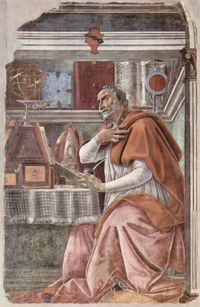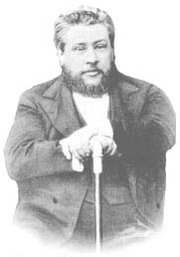 A recent post of mine on Augustine spawned a debate concerning Augustine’s views on predestination. Someone asked if I knew what Augustine really believed on grace and free will. He had read a former Reformed Protestant turned Catholic who claimed Augustine actually taught what Catholics affirm. Of course, Calvin and Luther must have been mistaken in their reading of Augustine, then.
A recent post of mine on Augustine spawned a debate concerning Augustine’s views on predestination. Someone asked if I knew what Augustine really believed on grace and free will. He had read a former Reformed Protestant turned Catholic who claimed Augustine actually taught what Catholics affirm. Of course, Calvin and Luther must have been mistaken in their reading of Augustine, then.
I was hesitant to discuss the matter since radical claims made by a single author are often just speculation. Yet my blogging friend John Chitty opened up the standard Catholic encyclopedia and was surprised at what he found. He posted a quote which he says claims Augustine affirmed prescience, that God foresaw all possibilities and elected in such a way as to conform to one set of possibilities which He wanted and simultaneously did not interfere with man’s free will.
I told John I didn’t think that quote exactly asserts that Augustine held to prescience. Upon reading more closely from that Catholic encyclopedia, it is apparent the quote is the Encyclopedia’s not Augustine’s. And they are arguing for a specific interpretation of Augustine. Still though, how could they claim Augustine on this view, if he was so surely Reformed as Protestants would claim?
The Dilemma
I rummaged through several online articles looking for some light on this question. In the introduction to The Cambridge Companion to Augustine (only the intro is available online) I found the following assessment which speaks to our problem.
The next chapter, my “Augustine on free will,” is concerned with Augustine’s struggle to understand the nature of the freedom to be found in the will. There is widespread controversy over this part of Augustine’s thought, so much so that it is sometimes hard to believe the participants in the controversy can be reading the same texts of Augustine’s. I argue that part of the problem stems from the fact that contemporary theories about free will have formed the lenses through which scholars have read Augustine’s texts, and that these theories are inadequate to capture his position…. (emphasis added)
Part of the confusion stems from the fact that Augustine was often writing in response to heresies. His statements on free will directed against the Manichees will look different than those directed against Pelagius. Yet each is a response and so is not his full orbed view, necessarily.
“Extreme” on Predestination
So this explains that we are right to be puzzling over this, but it doesn’t help solve our dilemma. However, it is fairly mainstream to understand Augustine as being extreme in his views on predestination. Consider the following.
Even those who most usually agree with his theological standpoint will hardly deny that, while he did much in these writings to vindicate divine truth and to expound the true relations of the divine and human, he also, here as elsewhere, was hurried into extreme expressions as to the absoluteness of divine grace and the extent of human corruption. — 1911 Encyclopedia Britannica
Though revering Augustine, many theologians have refused to accept his more extreme statements on grace. — Columbia Encyclopedia
While Augustine’s massive influence on Christian thought has mainly been for the good, his teaching on Predestination has been rightly criticized. Although he has always been regarded as the Doctor of Grace, he developed an obsessive concern with the massa peccati and the massa damnata which led to a Predestinarian pessimism which consigned unbaptized infants and others to eternal perdition. — The Dictionary of Saints (as seen at Answers.com)
While Augustine argued for predestination, he seems not to have held to a rigid double predestination view that John Calvin had. He does speak of the non-elect as “predestined to punishment”, yet this is viewed passively [see the section on double predestination here]. The Philosophy Dictionary (as seen at Answers.com) claims Augustine held to “the predestination of the elect” yet “It was left to Calvinism to add the predestination of the damned”.
Augustine’s Unique Approach
In his excellent article (replete with quotes) “Augustine’s Framing of the Predestination Debate”, Greg Johnson points out that Augustine approached the question of predestination differently than most Reformed people do today.
For some modern Augustinians, the doctrine of election is an outgrowth of theology proper, a necessary corollary to the sovereignty of God. The emphasis with this approach falls on an eternal decree from all eternity determining two vehicles through which God’s glory should be displayed, the elect and the reprobate, the fall being decreed as a means toward this end. Thus the question is framed in light of eternity. For others, the question is framed in light of God’s providential outworking in history, God working all things together for the good of His elect, so as to provide the instrumentality necessary to induce faith. Here the question is framed in light of divine providence. But Augustine takes neither of these approaches. The question of predestination is not primarily one of divine sovereignty and human responsibility. Rather, Augustine frames the question of predestination in light of the believers experience of grace in light of man’s fall. When Augustine considers the effects of Adam’s sin upon his posterity, the Christian’s experience of grace becomes the integrating point for Augustine’s doctrine of election. Within Augustine’s affectional theology, predestination explains the believer’s change in affections, the grace to love God being given to one and not to another.
This I’m sure makes it more difficult to understand Augustine’s true position, since he is looking at the problem differently than most moderns.
Free Will yet Fettered Affections
Another hindrance to interpreting Augustine is his distinction between free will and liberty. R.C. Sproul expounds on this point in his helpful book Willing to Believe: The Controversy over Free Will.
At times Augustine seems to deny all freedom to the will of fallen man. In The Enchiridion, for example, he writes: “…when man by his own free-will sinned, then sin being victorious over him, the freedom of his will was lost.”
How can we square this statement with Augustine’s insistence elsewhere that man always has freedom of the will? Some critics of Augustine think that anyone who attempts to resolve this difficulty is on a fool’s errand. They assert that Augustine simply hardened his position in his later years in light of the Pelagian crisis and contradicted his earlier teaching.
To square the problem let us look at two matters. The first is Augustine’s crucial distinction between free will (liberum arbitrium) and liberty (libertas)…. When he speaks of free will, he means the ability to choose without external constraining.
The sinner sins because he chooses to sin, not because he is forced to sin…. He is in bondage to his own sinful influences. To escape this bondage the sinner must be liberated by the grace of God. For Augustine the sinner is both free and in bondage at the same time, but not in the same sense. He is free to act according to his own desires, but his desires are only evil…. This corruption greatly affects the will, but it does not destroy it as a faculty of choosing. (Willing to Believe, pg. 68)
The Triumph of Grace
With man’s will thus enslaved to his desires, God must triumph through grace. God gives the new desires which free man’s will to trust and believe Christ. Greg Johnson provides a helpful quote by Augustine on this point.
We, however, on our side affirm that the human will is so divinely aided in the pursuit of righteousness, that (in addition to man’s being created with a free will, and in addition to the teaching by which he is instructed how he ought to live) he receives the Holy Ghost, by whom there is formed in his mind a delight in, and a love of, that supreme and unchangeable good which is God.
R.C. Sproul adds this quote which should put the question of whether Augustine is “Reformed” in his beliefs, to rest.
When, therefore, He predestinated us, He foreknew His own work by which He makes us holy and immaculate. He, therefore, worketh the beginning of our belief who worketh all things; because faith itself does not precede that calling…. For He chose us, not because we believed, but that we might believe…. Neither are we called because we believed, but that we may believe; and by that calling which is without repentance it is effected and carried through that we should believe. (Augustine, On the Predestination of the Saints, translated by R.E. Wallis, 1:810-11; quoted in Willing to Believe, pg. 66)
In conclusion, let me stress this is not the definitive answer regarding Augustine. I don’t profess that all of his views are correct on this issue. He may well have held to some form of prescience as he sought to explain and harmonize his views on free will and predestination. Yet he was clearly “Reformed” in his predestination views. I should stress that I do strongly object to many of Augustine’s other positions (for more on that see my previous article). But I am thankful for his influential teaching on predestination. Calvin and Luther would likely say the same.
picture above is Botticelli’s depiction of Augustine from Wikipedia
Like this:
Like Loading...
 Loved by many, yet hated by more. John Calvin, the great Reformer, has bequeathed us a schizophrenic legacy.
Loved by many, yet hated by more. John Calvin, the great Reformer, has bequeathed us a schizophrenic legacy.
 10 years earlier (1857), Spurgeon had said:
10 years earlier (1857), Spurgeon had said:
 A
A